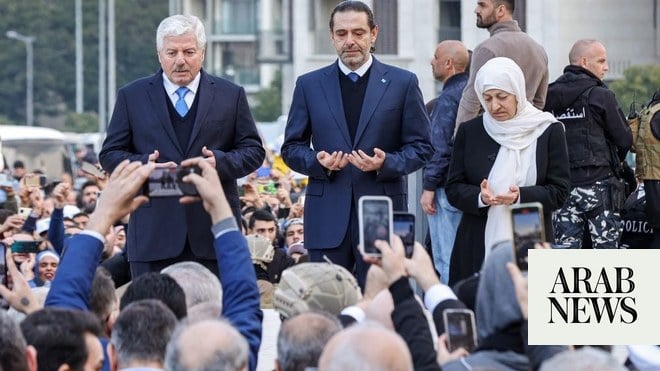
The blast killed 215 people, injured more than 6,500 and destroyed large swathes of the city
BEIRUT: Lebanon has declared Aug. 4 a national day of mourning ahead of the first anniversary of the deadly Beirut blast.
As part of the mourning, all public administrations and government institutions will be closed and flags will fly at half-mast.
Regular scheduling of radio and television will also be changed to commemorate the tragedy, which was caused by a massive explosion of ammonium nitrate stored in the Port of Beirut.
The blast killed 215 people, injured more than 6,500 and destroyed large swathes of the city.
An investigation into the blast has failed to deliver an indictment so far, with judge Tarek Bitar waiting on a request to lift immunity from three former lawmakers and ministers as a first step toward formally charging them.
A strike by lawyers in Lebanon has also served as an excuse for the defendants to avoid appearing with their attorneys before Bitar.
The Cassation Public Prosecution on Wednesday told Bitar to “take the necessary measures to determine the suspicions and evidence against Gen. Abbas Ibrahim, director general of the General Security, before prosecuting him.”
The Lebanese Cabinet announced on Wednesday that it cannot permit the prosecution of Maj. Gen. Tony Saliba, director general of State Security, and that instead, the Supreme Defense Council must grant permission.
If given permission, Bitar will be entitled to question both officials and prosecute them along with caretaker Prime Minister Hassan Diab and many others, including former army commander Gen. Jean Kahwaji.
Charges likely to result from court cases range from omission and negligence offenses to constructive malice of murder, because several defendants were allegedly aware of the large quantities of ammonium nitrate in the port, but did not act to prevent an incident.
Bitar is preparing to simulate the explosion and had earlier set a date for the simulation at the end of July. But according to Arab News’ sources, “the simulation process is related to the weather conditions and other logistics related to the Customs and General Security.”
The Aug. 4 blast left thousands of people in Beirut homeless and damaged areas surrounding the city, with streets left covered with glass and blood. Debris remained across the city for several days.
A year after the blast, many of the wounded are still undergoing surgery.
Salwa Baalbaki, a journalist at An-Nahar newspaper, told Arab News: “My right hand has been operated upon twice so far, as the tendons were ruptured by the broken glass that fell in my office, across the port.”
She is still receiving physical therapy and cannot hold a pen properly.
Baalbaki said that she moved to a village in the south of the country and is working remotely as she cannot return to the An-Nahar building, which is still undergoing restoration and renovation work.
She added: “I went to Beirut two days ago and headed to the An-Nahar building, but I started shivering and had a panic attack. I cried a lot. I am devastated and the current crises have only made it worse for me. I can’t sleep at night.
“Specialists at the American University of Beirut told me all those who were wounded by the blast are feeling the same way and have not been able to return to their normal lives yet.
“Every time I watch the news about the Beirut blast or listen to the families of the victims speaking, I get emotional and start crying. The civil war failed to do what the blast did to me. I have been losing my focus and forgetting a lot. Everything reminds me of the explosion. I think I am going to have to see a therapist.”
Baalbaki said that she paid for her own physical therapy, as “nobody cares for us.”
She noted her resentment toward Lebanon’s political class “as they committed their crime and left us to pay the price for it.
“I wish I could leave the country for good and never have to hear anything about it again, but my father is old and cannot travel and that is what is keeping me here, but this country does not mean anything to me anymore,” she said.
Heritage buildings in residential areas surrounding the port have remained destroyed and deserted, while residents have returned to other buildings that were restored by local private associations through foreign support.
Brazilian football star Ronaldinho arrived on Tuesday in Beirut to support and stand in solidarity with the Lebanese people on the first anniversary of the blast.
He visited the Beirut Fire Brigade headquarters in Karantina and the Civil Defense center at the port, which lost 10 personnel who were trying to extinguish a fire in the silo at the source of the explosion.
Ronaldinho lay a wreath for the victims and met officials fron associations that helped in the reconstruction and relief of the affected.












